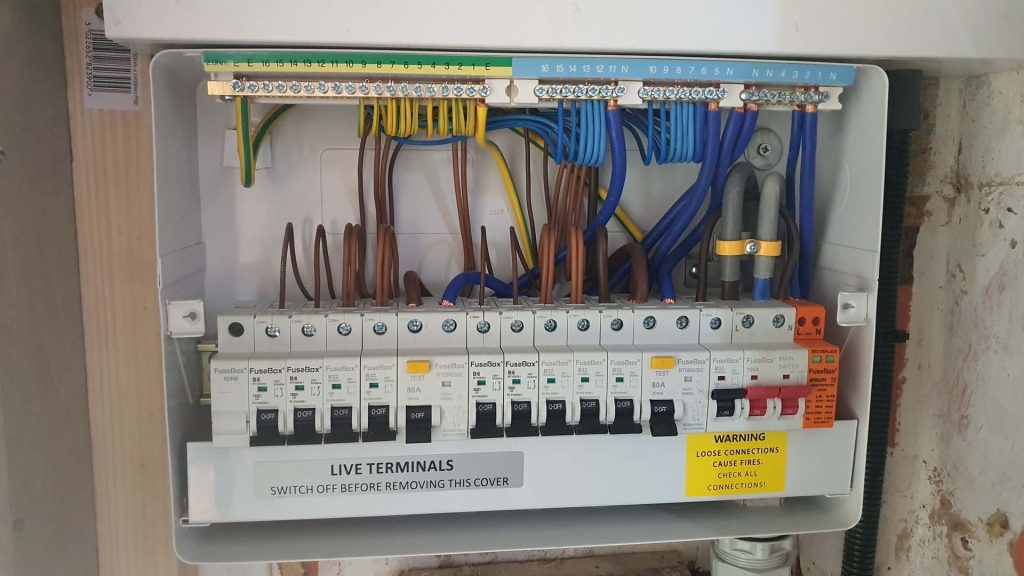Electrical wiring doesn’t last forever. Over time, house wiring degrades, becomes outdated, or simply cannot cope with modern electrical demands. If your property hasn’t been rewired within the last 25-30 years, it might be time to consider this essential upgrade. Faulty or outdated wiring isn’t just inconvenient – it presents serious safety risks including electrical fires and shocks.
What are the warning signs your house needs rewiring?
Your home might be giving you clear signals that its electrical system is failing or outdated. Recognising these early warning signs could prevent dangerous situations and expensive emergency repairs.
Frequent circuit breaker trips
If your circuit breakers trip regularly when using multiple appliances, this suggests your electrical system cannot handle current demands. Modern households use significantly more electricity than homes did decades ago. Between computers, entertainment systems, kitchen appliances and charging devices, older wiring systems simply weren’t designed to cope with this level of demand.
Flickering or dimming lights
Do your lights flicker when major appliances switch on? This common symptom indicates your wiring might be struggling to provide consistent power throughout your home. While occasional flickering might happen during storms, persistent issues signal potential wiring problems requiring professional inspection.
Burning smells or discoloured outlets
Perhaps the most concerning warning sign is detecting burning odours near switches or sockets. This typically indicates overheating wiring behind your walls. Similarly, any discolouration (brown or black marks) around sockets and switches suggests dangerous heat damage has already occurred. These situations require immediate attention from a qualified electrician, as they present immediate fire hazards.
Electric shocks
Even minor electric shocks when plugging in appliances indicate potentially serious wiring issues. No electrical shock should ever be considered normal or acceptable in a properly functioning system. This symptom often points to improper grounding or damaged insulation within your electrical system.
Outdated consumer unit
An older-style fuse box with ceramic fuses rather than a modern consumer unit with circuit breakers and RCDs (Residual Current Devices) strongly suggests your property needs rewiring. Modern consumer units provide crucial safety features that protect against electrical fires and electric shocks – protection that older systems simply cannot provide.
How does the age of your property affect rewiring needs?
The age of your property often provides the clearest indication of whether rewiring is necessary. Different construction periods used different wiring methods, many of which don’t meet modern safety standards.
Pre-1970s properties
Houses built before the 1970s frequently contain outdated wiring systems that weren’t designed for modern electrical usage. These properties commonly feature:
Rubber-insulated wiring – This insulation deteriorates over time, becoming brittle and cracking, exposing live wires.
Fabric-covered cables – These older cables lack proper earthing and cannot safely handle modern electrical loads.
Two-wire systems without earth wires – These systems lack the crucial safety feature that prevents electric shocks.
1970s-1990s properties
While homes from this period typically have safer PVC-insulated wiring, they were still designed for much lower electrical consumption than today’s households require. Many lack sufficient socket outlets, leading to dangerous overuse of extension leads and adaptors.
Modern electrical demands
Today’s homes require significantly more electrical capacity than ever before. Multiple computers, entertainment systems, kitchen appliances, EV charging points, and smart home devices create demands that older systems simply weren’t designed to handle safely.
What happens during the house rewiring process?
House rewiring involves completely replacing your property’s electrical infrastructure. Understanding the process helps you prepare for this significant home improvement project.
First fix stage
During this initial phase, electricians will:
- Remove old wiring throughout the property
- Install new cabling behind walls, under floors and above ceilings
- Position new back boxes for sockets and switches
- Install the new consumer unit location
This stage is most disruptive, often requiring floorboard removal, wall chasing, and accessing loft spaces. First fix typically occurs before plastering in renovation projects or new builds.
Second fix stage
Once the structural work and plastering are complete, electricians return to:
- Install socket faces, light fittings and switches
- Connect the new consumer unit
- Test all circuits thoroughly
- Connect the system to the mains supply
- Issue electrical safety certificates
Time expectations and disruption
A typical three-bedroom semi-detached house rewire usually takes 5-10 days depending on accessibility and property condition. While disruptive, professional electricians work methodically to minimise inconvenience, often completing work room by room to allow continued occupation where possible.
Why is professional rewiring important for your property?
Beyond simply addressing immediate problems, professional rewiring offers numerous benefits that make it a worthwhile investment.
Enhanced safety standards
Modern wiring systems incorporate multiple safety features that older installations lack. RCDs provide protection against electric shocks, circuit breakers prevent overloading, and proper earthing ensures dangerous faults are safely discharged. Professional rewiring brings your property in line with current BS 7671 wiring regulations.
Future-proofing your electrical system
A properly designed modern electrical system accommodates both current needs and future expansion. Strategic placement of sufficient sockets reduces the need for potentially dangerous extension leads. Dedicated circuits for high-demand appliances ensure stable power delivery throughout your home.
Increased property value
Buyers increasingly recognise the importance of sound electrical systems. A property with recent rewiring certification represents lower risk and immediate cost savings for potential buyers. Estate agents frequently highlight modern electrical systems as a significant selling point.
Insurance benefits
Many insurance providers require properties to have electrical installations that meet current regulations. Outdated wiring might invalidate home insurance policies or result in higher premiums due to increased fire risk. Professional rewiring with appropriate certification helps ensure full insurance coverage.
Energy efficiency improvements
Older wiring systems often waste electricity through resistance and poor connections. Modern cabling reduces energy loss, potentially lowering electricity bills. A rewire also provides opportunity to install energy-efficient lighting circuits and smart home control systems.
What should you do if you suspect your house needs rewiring?
If you’ve identified warning signs or your property falls into an age category likely to need rewiring, taking proper steps ensures your safety and helps plan this significant project.
Professional electrical inspection
The first step should always be a professional Electrical Installation Condition Report (EICR). This thorough inspection examines your entire electrical system, identifying any defects, potential hazards, or areas requiring improvement. A qualified electrician will rate each issue by severity, providing clear recommendations for necessary work.
Finding qualified electricians
Always ensure your electrician is registered with a recognised scheme like NICEIC, ELECSA or NAPIT. These registrations demonstrate the electrician meets strict standards for electrical safety work. Electricians in Wigan like Relec Ltd provide fully accredited services with proper certification and guarantees.
Planning for disruption
Rewiring inevitably causes some disruption to your home. Planning ahead minimises inconvenience:
- Schedule work during planned renovations if possible
- Consider temporarily relocating particularly vulnerable family members
- Protect furniture and belongings with dust sheets
- Establish clear communication channels with your electrician
- Prepare alternative cooking and refrigeration options if kitchen circuits will be affected
How can you maintain your electrical system after rewiring?
Once your property has been professionally rewired, proper maintenance ensures long-term safety and performance.
Regular inspections
Even modern electrical installations require periodic inspection. For owner-occupied homes, the recommendation is testing every 10 years. Rental properties require more frequent inspection, typically every 5 years or when tenants change.
Proper usage habits
Avoid overloading sockets with multiple high-demand appliances. Be wary of any unusual smells, sounds or performance from your electrical system. Never attempt DIY electrical modifications to a professional installation.
Professional modifications
If you need additional sockets or lighting in the future, always use qualified electricians for these modifications. Improper alterations to a well-designed system introduce unnecessary risks and might invalidate safety certifications.
Conclusion
Your home’s electrical system plays a vital role in both safety and functionality. Outdated or damaged wiring presents significant risks that shouldn’t be ignored. Professional rewiring brings your property up to modern safety standards while providing the capacity needed for contemporary electrical demands.
If you’ve noticed warning signs or your property is more than 25 years old without a rewire, contacting a qualified electrician for an inspection represents a prudent first step. With proper assessment, you can make informed decisions about this important home improvement project.
For expert advice or to schedule an electrical inspection, contact Relec LTD on 07380 392 496 to discuss your property’s electrical needs.


